2020 was a year of events. Though time became warped when we went into isolation, it remained hugely punctuated on the global level: the pandemic, the protests, the election. On the personal level, it was the same, at least for me; I can tell you where I was emotionally every month, and by the same token what I was reading, since the two are often inextricable.

 2021 was a different beast. Blurrier, seemingly blander, much more limbo-esque. January is one of the only months I can report anything definitive about without consulting my journal or work calendar. News-wise there was the coup and the mounting death rates. Me-wise there was the publication of my first novel. All of it chaotic and frightening, and for my pleasure reading, I needed books I could trust, the safe, soothing hands of favorite writers. I started with the treasured galley I’d been saving of Kazuo Ishiguro’s Klara and the Sun, which in its strange way was incredibly reassuring. First, probably, because it took me into a mind so radically not my own; and second because it was so removed from the narrow-minded arguments of the present and so undaunted in its tackling of the big questions—what does it mean to be human? To be alive? No other novelist today seems to me to produce work so timeless. That month I also read J.M. Coetzee’s Waiting for the Barbarians, and, for the first time, Edith Wharton’s Ethan Frome. A brutal love story set against deep New England snows, it was a perfect companion for the dark days of winter.
2021 was a different beast. Blurrier, seemingly blander, much more limbo-esque. January is one of the only months I can report anything definitive about without consulting my journal or work calendar. News-wise there was the coup and the mounting death rates. Me-wise there was the publication of my first novel. All of it chaotic and frightening, and for my pleasure reading, I needed books I could trust, the safe, soothing hands of favorite writers. I started with the treasured galley I’d been saving of Kazuo Ishiguro’s Klara and the Sun, which in its strange way was incredibly reassuring. First, probably, because it took me into a mind so radically not my own; and second because it was so removed from the narrow-minded arguments of the present and so undaunted in its tackling of the big questions—what does it mean to be human? To be alive? No other novelist today seems to me to produce work so timeless. That month I also read J.M. Coetzee’s Waiting for the Barbarians, and, for the first time, Edith Wharton’s Ethan Frome. A brutal love story set against deep New England snows, it was a perfect companion for the dark days of winter.


 Winter this year was especially dark—and long. It’s here the chronological and narrative fuzziness sets in for me. I remember my couch and my girlfriend’s and lazy mornings and black afternoons and a sad dreariness that some books accentuated and others alleviated. When, which couch, what if anything was happening outside these pages—it’s an unsettling blank I draw. I read two gorgeous and form-pushing memoir-novels, Jennifer Croft’s Homesick and Yiyun Li’s Where Reason Ends. I read Abdellah Taïa’s A Country for Dying, a symphony of immigrant experiences in Paris, which revealed to me a gritty corner of the City of Lights I’d never seen. I read Ayad Akhtar’s Homeland Elegies, which although wildly different, struck a similar chord in me about the infinite complexities of being an immigrant or the child of one. The energy of his prose and his thoughts and his provocativeness provided sweet ruptures to my malaise.
Winter this year was especially dark—and long. It’s here the chronological and narrative fuzziness sets in for me. I remember my couch and my girlfriend’s and lazy mornings and black afternoons and a sad dreariness that some books accentuated and others alleviated. When, which couch, what if anything was happening outside these pages—it’s an unsettling blank I draw. I read two gorgeous and form-pushing memoir-novels, Jennifer Croft’s Homesick and Yiyun Li’s Where Reason Ends. I read Abdellah Taïa’s A Country for Dying, a symphony of immigrant experiences in Paris, which revealed to me a gritty corner of the City of Lights I’d never seen. I read Ayad Akhtar’s Homeland Elegies, which although wildly different, struck a similar chord in me about the infinite complexities of being an immigrant or the child of one. The energy of his prose and his thoughts and his provocativeness provided sweet ruptures to my malaise.
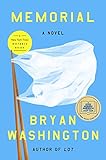

 In that foggy, cold, waiting-for-vaccines period there were other year-old hits I finally opened including Bryan Washington’s Memorial, Raven Leilani’s Luster, and Kevin Barry’s Night Boat to Tangier, all of which lived up entirely to the hype. Another stand-out in my catching up on 2020 books was Sanaë Lemoine’s The Margot Affair, a wonderfully intimate coming of age story that squarely focused on the heart rather than the head in a way I wish more debuts today would. And probably my favorite reading experience of the year, the one that will most entrench itself in my psyche—Susannah Clarke’s Piranesi. Never did I think an exploration of isolation could be so magical. It reminded me of the full power of the imagination, and how exhilarating it is to get lost in its mysterious halls.
In that foggy, cold, waiting-for-vaccines period there were other year-old hits I finally opened including Bryan Washington’s Memorial, Raven Leilani’s Luster, and Kevin Barry’s Night Boat to Tangier, all of which lived up entirely to the hype. Another stand-out in my catching up on 2020 books was Sanaë Lemoine’s The Margot Affair, a wonderfully intimate coming of age story that squarely focused on the heart rather than the head in a way I wish more debuts today would. And probably my favorite reading experience of the year, the one that will most entrench itself in my psyche—Susannah Clarke’s Piranesi. Never did I think an exploration of isolation could be so magical. It reminded me of the full power of the imagination, and how exhilarating it is to get lost in its mysterious halls.

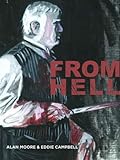 This was all what I earlier called pleasure reading—that is, reading outside of my work as a book editor. No submissions or edited manuscripts included. But even so, the line often gets blurry. Sometimes you read a book to know the market, the competition. Sometimes to find a perfect blurber. Sometimes you acquire an author with previously published books, and you acquaint yourself—or reacquaint yourself. For me there was a lot of reacquainting in that late spring-early summer sludge. I had the incredible luck of becoming the editor of Alan Moore, and in celebration slash homage to the high school version of me who first fell in love with his work, I immediately reread Watchmen and From Hell. Works of genius and stunning imaginative power just as good nearly two decades later.
This was all what I earlier called pleasure reading—that is, reading outside of my work as a book editor. No submissions or edited manuscripts included. But even so, the line often gets blurry. Sometimes you read a book to know the market, the competition. Sometimes to find a perfect blurber. Sometimes you acquire an author with previously published books, and you acquaint yourself—or reacquaint yourself. For me there was a lot of reacquainting in that late spring-early summer sludge. I had the incredible luck of becoming the editor of Alan Moore, and in celebration slash homage to the high school version of me who first fell in love with his work, I immediately reread Watchmen and From Hell. Works of genius and stunning imaginative power just as good nearly two decades later.
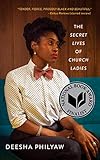
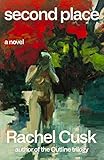
 In July, I went to France, meaning I finally made associations with books beyond a couch. There was Deeshaw Philyaw’s The Secret Lives of Church Ladies, which I devoured gleefully on my first plane ride in two years. There was Rachel Cusk’s Second Place, which I lingered over at cafes on the Canal Saint-Martin and the Parc des Buttes-Chaumont. Her sentences in that book, at once so sharp and lush, are the kind that make you look up and think, and there may be no better place in the world to do that than Paris. I read Sabrina and Corina by Kali Fajardo-Anstine, another dazzling short story collection as good as everyone said it was, and In Concrete by Anne Garetta, brilliantly translated by Emma Ramadan. This was a kind of romp to the limits of language (and translation), a book written entirely in puns and slang that reminded me just how joyful playing with words could be.
In July, I went to France, meaning I finally made associations with books beyond a couch. There was Deeshaw Philyaw’s The Secret Lives of Church Ladies, which I devoured gleefully on my first plane ride in two years. There was Rachel Cusk’s Second Place, which I lingered over at cafes on the Canal Saint-Martin and the Parc des Buttes-Chaumont. Her sentences in that book, at once so sharp and lush, are the kind that make you look up and think, and there may be no better place in the world to do that than Paris. I read Sabrina and Corina by Kali Fajardo-Anstine, another dazzling short story collection as good as everyone said it was, and In Concrete by Anne Garetta, brilliantly translated by Emma Ramadan. This was a kind of romp to the limits of language (and translation), a book written entirely in puns and slang that reminded me just how joyful playing with words could be.


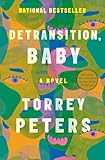 The rest of summer is a bit of a hot, indistinct line to autumn. I know I read David Grann’s Killers of the Flower Moon on a beach in Block Island, still in vacation mode, and Marie Ndiyae’s La Divine on a bus to Cape Cod and Detransition, Baby in the mornings in Fort Greene Park, waiting to sign up for a tennis court. I know I read Juan Gabriel Vasquez’s Song for the Flames and that, inspired by the title or the desire for more haunting, moody stories from Latin America, I returned to The Plain in Flames by Juan Rulfo, another favorite writer.
The rest of summer is a bit of a hot, indistinct line to autumn. I know I read David Grann’s Killers of the Flower Moon on a beach in Block Island, still in vacation mode, and Marie Ndiyae’s La Divine on a bus to Cape Cod and Detransition, Baby in the mornings in Fort Greene Park, waiting to sign up for a tennis court. I know I read Juan Gabriel Vasquez’s Song for the Flames and that, inspired by the title or the desire for more haunting, moody stories from Latin America, I returned to The Plain in Flames by Juan Rulfo, another favorite writer.
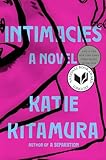
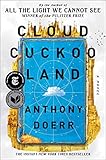
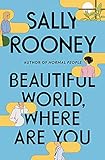 At some point it became big book season and I did my part. I read Katie Kitamura’s Intimacies and became entranced by the strange atmosphere she created. I read Cloud Cuckoo Land by Anthony Doerr, whose feats of lyricism continue to astound. And yes, I read Beautiful World, Where Are You? by Sally Rooney, which I enjoyed but in a sort of apathetic way. My hot take is that it was far less overrated than many other books this year, but that on the other hand, I might not have remembered reading it at all if not for my writing this piece.
At some point it became big book season and I did my part. I read Katie Kitamura’s Intimacies and became entranced by the strange atmosphere she created. I read Cloud Cuckoo Land by Anthony Doerr, whose feats of lyricism continue to astound. And yes, I read Beautiful World, Where Are You? by Sally Rooney, which I enjoyed but in a sort of apathetic way. My hot take is that it was far less overrated than many other books this year, but that on the other hand, I might not have remembered reading it at all if not for my writing this piece.

 Now, though, I want to be surprised again, to connect in that more private way with something, or be transported to a world I feel I am among the few to visit. Kamel Daud’s Zabor or the Psalms is up next, Elizabeth Metzger’s poetry collection Bed, and after that I don’t know. A new discovery hopefully, one I can use as a marker for a year that otherwise had so few. A book that allows me to look back on 2021 and say that, though the light at the end of the pandemic tunnel dimmed and grew far away, I found something else to lead me out of the darkness.
Now, though, I want to be surprised again, to connect in that more private way with something, or be transported to a world I feel I am among the few to visit. Kamel Daud’s Zabor or the Psalms is up next, Elizabeth Metzger’s poetry collection Bed, and after that I don’t know. A new discovery hopefully, one I can use as a marker for a year that otherwise had so few. A book that allows me to look back on 2021 and say that, though the light at the end of the pandemic tunnel dimmed and grew far away, I found something else to lead me out of the darkness.
More from A Year in Reading 2021 (opens in a new tab)
Don’t miss: A Year in Reading 2020, 2019, 2018, 2017, 2016, 2015, 2014, 2013, 2012, 2011, 2010, 2009, 2008, 2007, 2006, 2005










